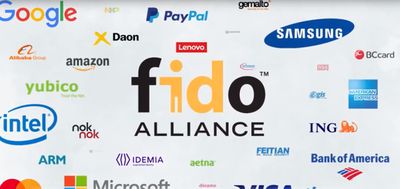Apple Joins the FIDO Alliance to Help Develop and Promote Authentication Standards
Apple has joined the Fast Identity Online (FIDO) Alliance, an open industry association whose mission is to develop and promote stronger authentication standards and help reduce the world's over-reliance on passwords.

Apple joins existing members Amazon, Facebook, Microsoft, Samsung and others in a common goal to secure online connections and support the adoption of the U2F authentication standard, which the alliance hosts.
Universal 2nd Factor (U2F) is an open standard that strengthens and simplifies two-factor authentication (2FA) using specialized USB or near-field communication (NFC) devices based on similar security technology found in smart cards. U2F security keys can be used as an additional method of two-step verification in online services that support the U2F protocol, such as Google, Dropbox, and Facebook.
Chrome, Firefox, Edge, and Opera browsers natively support U2F. With iOS 13.3, Apple's Safari also supports FIDO2-compliant physical security keys like the Lightning-equipped YubiKey.
With Safari support, the YubiKey 5Ci is a useful tool that can be more convenient than software-based two-factor authentication because there's no need to enter a security code -- you simply plug it in to an iPhone or Mac (there's also a USB-C connector) to authenticate. Support for FIDO2-compliant USB security keys using WebAuthn was previously added to Safari 13 in macOS.
FIDO was founded in 2013 by a group including Lenovo and Paypal to address the lack of interoperability among strong authentication. MacGeneration was first to spot Apple's logo added to the list of board members.
Popular Stories
If you have been experiencing issues with wireless CarPlay in your vehicle lately, it was likely due to a software bug that has now been fixed.
Apple released iOS 18.4.1 today, and the update's release notes say it "addresses a rare issue that prevents wireless CarPlay connection in certain vehicles."
If wireless CarPlay was acting up for you, updating your iPhone to iOS 18.4.1 should...
Apple is preparing a "bold" new iPhone Pro model for the iPhone's 20th anniversary in 2027, according to Bloomberg's Mark Gurman. As part of what's being described as a "major shake-up," Apple is said to be developing a design that makes more extensive use of glass – and this could point directly to the display itself.
Here's the case for Apple releasing a truly all-screen iPhone with no...
The first iOS 19 beta is less than two months away, and there are already a handful of new features that are expected with the update.
Apple should release the first iOS 19 beta to developers immediately following the WWDC 2025 keynote, which is scheduled for Monday, June 9. Following beta testing, the update should be released to the general public in September.
Below, we recap the key...
While the iPhone 17 Pro and iPhone 17 Pro Max are not expected to launch until September, there are already plenty of rumors about the devices.
Subscribe to the MacRumors YouTube channel for more videos.
Below, we recap key changes rumored for the iPhone 17 Pro models as of April 2025:
Aluminum frame: iPhone 17 Pro models are rumored to have an aluminum frame, whereas the iPhone 15 Pro and ...
Apple's iPhone development roadmap runs several years into the future and the company is continually working with suppliers on several successive iPhone models simultaneously, which is why we often get rumored features months ahead of launch. The iPhone 17 series is no different, and we already have a good idea of what to expect from Apple's 2025 smartphone lineup.
If you skipped the iPhone...
Despite being more than two years old, Apple's AirPods Pro 2 still dominate the premium wireless‑earbud space, thanks to a potent mix of top‑tier audio, class‑leading noise cancellation, and Apple's habit of delivering major new features through software updates. With AirPods Pro 3 widely expected to arrive in 2025, prospective buyers now face a familiar dilemma: snap up the proven...
Apple today released iOS 18.4.1 and iPadOS 18.4.1, minor updates to the iOS 18 and iPadOS 18 operating systems that came out last September. iOS 18.4.1 and iPadOS 18.4.1 come two weeks after the launch of iOS 18.4 and iPadOS 18.4.
The new software can be downloaded on eligible iPhones and iPads over-the-air by going to Settings > General > Software Update.
There have been complaints about ...
Apple today released tvOS 18.4.1, a minor update to the tvOS 18 operating system that came out last September. tvOS 18.4.1 comes two weeks after Apple released tvOS 18.4, and it is available for the Apple TV 4K and Apple TV HD models.
tvOS 18.4.1 can be downloaded using the Settings app on the Apple TV. Open up Settings and go to System > Software Update to get the new software....
Apple has quite a few security features that it's added to iPhones, iPads, and Macs over the years. Now more than ever, it's important to make sure you're taking advantage of the built-in security tools that are available to keep yourself and your data safe, so we've rounded up a list of the most important options.
If you don't already have these enabled, you might want to consider turning...
























